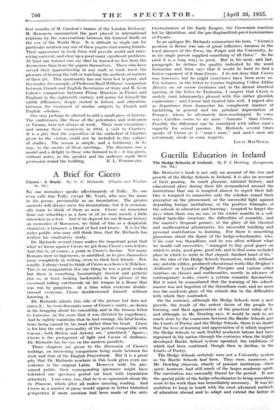A Brief for Cicero
No one nowadays speaks affectionately of Tully. No one even calls him Tully, except Mr. Yeats, who uses the name in his poems, presumably= as an incantation. The greater ancients will always serve for incantations, but it is occasion- ally tonic to think of them as men. Cicero we remember from our schooldays as a bore or (if we were merely a little shrewder) as a fool. And if we depend for our Roman history on memories of Mommsen, we think of him as a despicable Character, a trimmer, a blend of fool and knave. It is for the wider public, who may still think thus, that Dr. Richards has ivritten his vindicatory study.
Dr. Richards several times makes the important point that What we know against Cicero we get from Cicero's own letters. And this is, of course, a point in Cicero's favour. Not many Romans were so ingenuous, so unstilted, as to give themselves away completely in writing, even to their best friends. Per- rionally, I always tend to think of Cicero as a hero a to Tchehov. This is an exaggeration (for one thing he was a great worker) but there is something fascinatingly farcical and pathetic (for us, at least, looking backwards) in the picture of the es-consul rolling -eatchwords'oif his tongue in a Rome that was run by gangsters. At a time when everyone double- crossed everybne, 'Cicero —doublecrossed himself without knowing it.
Dr. Richards admits this side of the picture but does not Stress it ; he even discounts some of Cicero's vanity, as shown in his bragging about his consulship and in the famous letter to Lueceius, on the score that it was dictated by expediency. And he rightly maintains that he-had courage, his fatal hesita- tions being caused by his head rather than his heart. Cicero is for him the only personality of the period comparable with Caesar ; both Brutus and Antony are " pinchbeck " figures ; Cicero is the protagonist of light and Caesar of darkness. Dr. Richards has his eye on the modern parallels.
Three chapters are given to the discussion of Cicero's Writings, an interesting comparison being made between his style and that of the English Prayerbook. But it is a great pity that Dr. Richards nowhere in this book gives even one sentence in the original Latin. However wide his pre- sumed public, their corresponding ignorance might have tolerated one specimen period (at least with translation attached). I am sorry, too, that he is so squeamish about the In Pisonem, which after all makes amusing reading. And Cicero as a master of prose would appear in better historical perspective if more mention had been . made of the anti- Ciceronianism of the Early Empire, the Ciceronian reaction led by Quintilian, and the pre-Raphaelitish pro-Cieeronianisru of Fronto.
In an epilogue Dr. Richards summarizes his hero. " Cicero's position in Rome was one of great influence, because- in the total absence, of the Press, the Pulpit and the University, he in his single person supplied something of all three." :So -far (and it is a long way) so good. But in his -next, and. last, paragraph, he defines the quality indicated by the word hurhanitas and then says that it would be hard to find a better exponent of it than Cicero.. I do not deny that Cicero was humanus, but he might sometimes have been more so. For instance, in the letter to Cassius beginning Vellem Idibus Marliis me ad cenam inuitasses and in the almost identical opening of the letter to Trebonius, I suspect that Cicero is unduly (and inhumanely) pleased with this rather ghoulish euphemism ; and Caesar had treated him well. I regard also as departures from humanitas his complacent manner of backbiting in general and his petulant depreciation of Pompey. whom lie alternately hero-worshipped. In some ways Cattilitts seems to me more " humane " than Cicero. Possibly the difference can be correlated with either man's capacity for sexual passion. Dr. Richards several times speaks of Cicero as a " man's man," and men's men are notoriously crude itt some respects.
Louis 111AcNEIE.










































 Previous page
Previous page